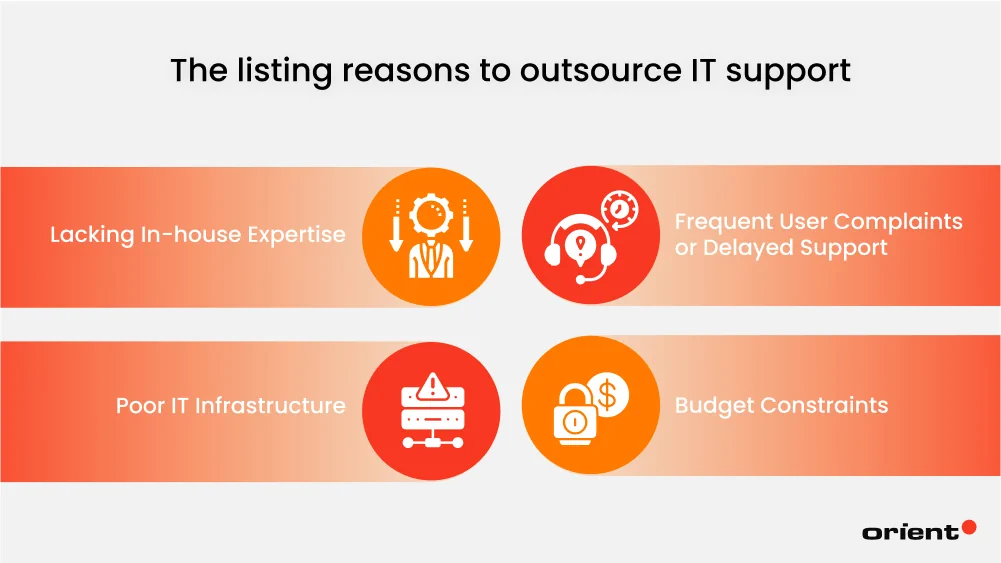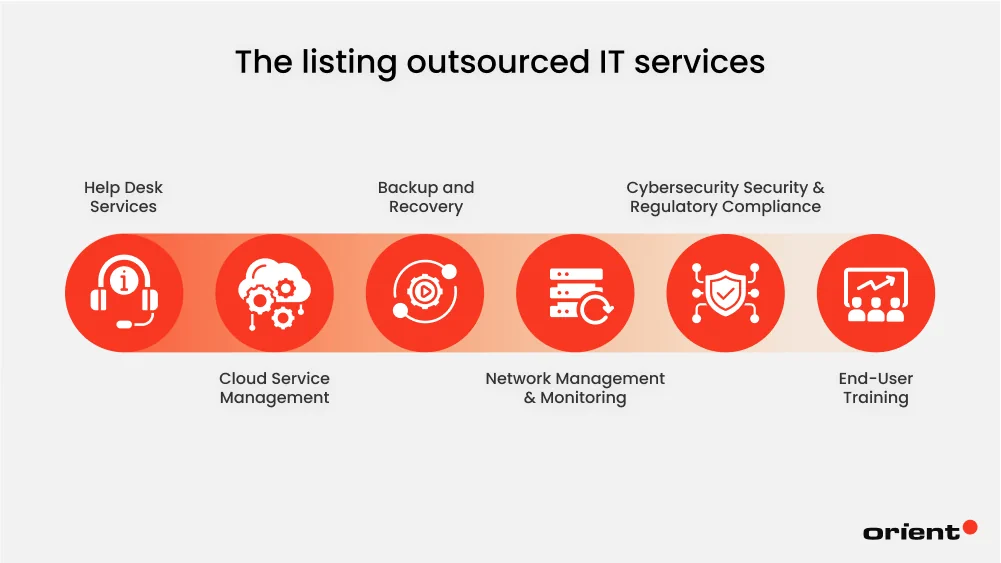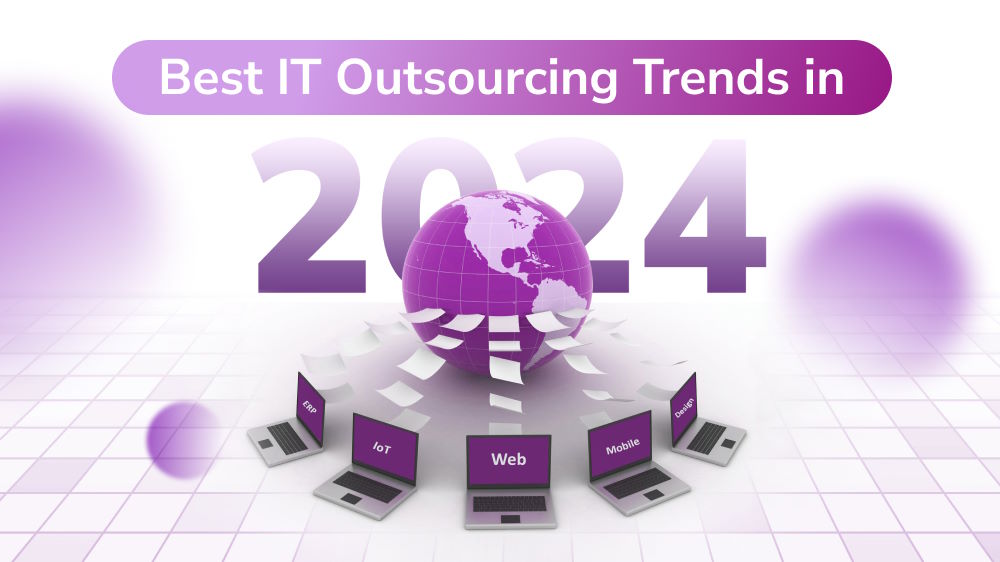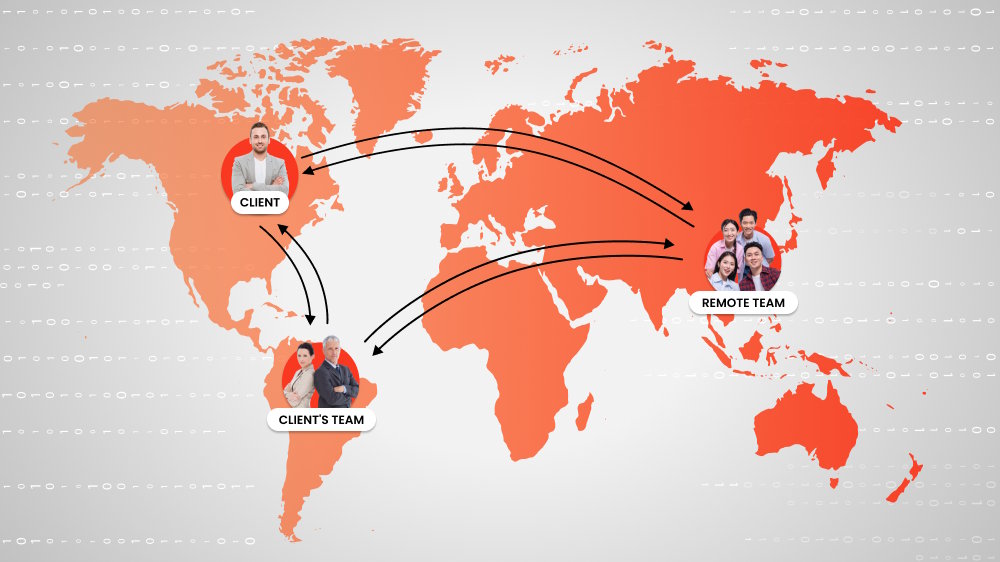
Is It Time to Outsource IT Support? Key Signs & Expert Tips
Outsourcing IT support gives you the expertise you need, exactly when you need it. No guesswork, no delays.

Content Map
More chaptersEvery aspect of business has become more and more reliant on technology. A small hiccup experienced within the system – a drop in WiFi connectivity, printing problems, password reset requests, or inconsistent data backup – may seem like a small issue in the short term, but can disrupt business operation or expose the system to security vulnerabilities. This is where IT support teams come in to make sure that the daily operation runs smoothly.
The IT support team is the unsung heroes. This team shouldn’t come as an afterthought – they should be at the forefront of your mind when it comes to business operations. There are many types of IT support teams to choose from – in-house, remote teams, or outsourced teams. In today’s article, we will discuss outsourcing IT teams, when they might be the right choice for you, and tips for you to kickstart your outsourcing journey with ease.

Key Takeaways:
- Outsourcing IT services is a suitable strategy when you need to fill skill gaps, have struggled with handling IT tickets, or when the IT infrastructure needs improving, but the budget is limited.
- You can outsource an entire IT department or part of it, also known as a co-managed IT support service.
- Depending on your company’s unique needs, you can also outsource specific services like help desk, network management, or cybersecurity.
- Outsourcing offers numerous benefits, like cost reduction, access to global talent, and focus on value-driven tasks. However, navigating outsourcing can be tricky, so it’s important to have a clear list of criteria to set practical expectations.
When Should You Consider Outsourcing IT Support?

Lacking In-house Expertise
Recruiting and building a comprehensive team of professionals to cover every specialized tech infrastructure need can be costly, and not every company has the ability to do so. In-house employees are tasked with taking care of the tech system, and in many cases, without the appropriate skill set, they fail to handle the issue at hand properly. This restriction in resources and experience can prevent the firm from growing sustainably, as the system has trouble meeting both customers’ and employees’ demands. This results in more long-term and costly problems down the line.
Outsourcing an IT help desk helps you curb all of the mentioned problems. Not only will the IT service provider have comprehensive technical expertise to take good care of your IT infrastructure, but they can also address and fix problems quickly, minimizing unwanted downtime.
Frequent User Complaints or Delayed Support
The growth of your business is directly proportional to the number of IT tickets your tech team receives. If you solely rely on your internal team to maintain the IT infrastructure and handle IT support tickets, the team is likely overstretched and overworked. The resolution time, as a result, is slow, and many of the issues are delayed. Again, these delays can lead to more long-term problems down the line that can quickly become costly.
Having support from a third-party provider enables your in-house team to prioritize core tasks, while the outsourced provider can quickly and efficiently handle other troubleshooting or bugs.
Poor IT Infrastructure
Perhaps you have noticed poor network connections or the system’s slow response. Perhaps it has been your main concern over the days, despite your internal IT team handling tickets on time and performing all their duties in a timely and efficient manner.
This is a sign that you should consider consulting with a credible service provider. IT help desk services aren’t only about handling tickets or maintaining infrastructures; they can help you upgrade and improve the existing ones, too. Keep in mind that poor IT infrastructure harms your business operation in more ways than one.
For starters, every task is slowed down and inefficient. Next, you find scaling the system to be a near-impossible task with its current state without the help of a professional. Last but not least, weak infrastructure is synonymous with weak security. Your IT system is vulnerable and exposed to potential threats, including data breaches, phishing, ransomware, and more.
Budget Constraints
Managing an IT department can quickly become costly. Recruiting can be timely and expensive, as are training, salaries, and benefits. You would also need to purchase hardware and software licenses. Sometimes, even then, you still find that your in-house team doesn’t cover IT tasks efficiently and thoroughly.
Outsourcing technical support means you only need to pay for the outsourcing costs. Your partner has everything covered – from the right type of talent, infrastructure, and software licensing. Another huge plus? There are multiple pricing models to choose from, whether it is per hour, per incident, a fixed price, or even hiring a dedicated team to support you.
Fully Outsourced IT Support vs Co-managed IT Support Services
There are two ways to go about outsourcing IT services: a full IT department or only part of it. In other words, you can consider fully outsourcing IT or choose co-managed IT support.

Fully Outsourced IT Support
This method of outsourcing often fits smaller businesses, which don’t yet have the resources to build their own IT teams. This hands-off approach means the third-party will take care of every aspect of the organization’s IT system, from overall IT strategic planning, network management and monitoring, to security and handling daily IT tickets. In other words, you are hiring a dedicated third-party IT team.
The downside of this approach, however, is the lack of control over the IT workflows. There is also a higher risk of leaking sensitive internal information, so it’s vital to implement strict policies regarding data, security, and communication channels.
Co-managed IT Support Services
Unlike fully outsourcing IT support, companies that rely on co-managed IT services often have an internal IT team. In this case, the company often works with a managed service provider (MSP), sharing IT responsibilities with the third-party vendor.
For example, the MSP might take care of advanced troubleshooting, cybersecurity, or large-scale projects. While working with an MSP is beneficial for companies with certain skill gaps or a fluctuating workload, it can also create coordination issues or security concerns. Nonetheless, thoroughly discussing these concerns with your MSP will greatly boost efficiency and upgrade your tech infrastructure.
What IT Support Services Can Be Outsourced?

There are multiple IT services for one to choose from. No two companies’ needs are the same; hence, start with understanding what your business and IT goals are. Below are some of the most common outsourced IT support services.
Help Desk Services
Help desk services ensure a smooth day-to-day operation, e.g., password resets, network connectivity issues, account management, and support users via multiple channels like emails or calls. Even though these tasks seem simple on the surface, they are often time-consuming and require sufficient resources to handle smoothly.
Outsourcing help desk service takes care of most of the legwork. This frees your internal resources to take care of other core, value-driven activities. Help desk outsourcing has become such a common practice that the global revenue of help desk outsourcing was USD 3,471.3 million in 2024 and is projected to grow to USD 5,822.1 million by 2030.
Cloud Service Management
An increasing number of businesses are moving to the cloud for cost efficiency and scalability. Clouds are a powerful tool and resource. However, as the saying goes, “The tool is only as good as the hand that wields it”, so for many businesses, the cloud’s advantages only truly materialize once they find a reliable vendor to manage it for them. This involves every facet of the cloud, from monitoring to performance optimization to making sure the cloud investment isn’t wasted on unused resources. In short, whether your company uses cloud resources like AWS, Google Cloud, or Azure, it’s best to have a team with the right expertise to maintain and manage your cloud.
Backup and Recovery
The importance of data is widely recognized, yet data backup and recovery often come as an afterthought. Backup and recovery involve more than simply copying and pasting of existing information – it also includes server configurations, user settings and preferences, and software applications.
It often is already too late when you scramble for IT backup and recovery when the infrastructure breaks, or data breaches happen. By then, the cost of backup and recovery is expensive and there is no guarantee you will recover the system to its original state.
Coming up with a comprehensive backup and recovery strategy, hence can become a daunting task. If you find yourself in this situation, it’s worth considering outsourcing this service to a team of professionals.
Network Management & Monitoring
Reliable data transfer and server connections rely heavily on strong network systems. This means the network is optimized to perform its functions, and every firewall, router, server, and network device is configured according to the business’s unique needs.
With an IT service provider on board, you can rest assured that the network is managed and monitored 24/7. They will take care of problems even before they have a chance to emerge and disrupt the operation, all while optimizing the most suitable network strategy.
Cybersecurity Security & Regulatory Compliance
Businesses face an array of security threats each day. Failing to protect your data and security properly results in direct financial loss – in 2024, the average global cost of a data breach was $4.88 million, which, compared to the average of $4.45 million in 2021, is a 10% increase (IBM) Businesses would also suffer from operational disruptions, damaged reputation, and legal liabilities.
Having an expert on the team ensures you are well-protected. Just as important is ensuring you comply with local and global security regulations, like GDPR or HIPAA, depending on the industry you work in. This allows you to go on with the peace of mind that your network and system are proactively protected from malicious attackers and other online threats.
End-User Training
A great IT investment goes beyond the tools and software – it also lies in its people. Many companies aim to maximize their investment by having their employees attend training programs. The most common ones involve raising awareness in cybersecurity, but there are a variety of training programs to choose from, covering both software and hardware systems. Most IT providers stay up-to-date with the latest technologies, regulations, policies, and threats. Training your employees is extremely beneficial, as it enhances problem-solving, boosts security awareness, and maximizes ROI on IT investments.
Is Outsourcing IT Support Worth it?
The short answer: Yes. If you are looking for a longer response, it depends. Multiple factors come into play when it comes to an outsourcing decision. However, if you want instant access to experts, especially in niche topics, or if you want to save costs and focus on what your company is already doing best, the answer is still a resounding yes.

Focus on Core Business Activities
As essential as an IT system is, managing and maintaining it isn’t always a strong suit for a company. It can be hard to focus on core business activities when you have to constantly worry about managing IT tickets, monitoring the network, or being unsure of the organization’s security measures.
Outsourcing part or the entire IT department takes the weight off your shoulders, and allows you to create value for the company. A strong and reliable IT system boosts efficiency and may even give you time and space to concentrate on innovating and developing new products. It’s a win-win situation.
Access to Expertise
IDC reports that nearly two-thirds of North American IT leaders link skill shortages to missed targets and quality issues, and predicts that by 2026, over 90% of organizations will face similar challenges, costing $5.5 trillion globally. This problem is magnified when you want to recruit specialized IT talent (cloud computing, data analytics or AI/ ML).
One solution to this problem is partnering with an outsourcing company that offers the right specialized talent and has experience in the industry you operate in. Gone are the days of searching high and low for that one talent and delaying your project – have your partner handle it.
Better Employee Experience
Technology has undoubtedly enhanced every aspect of businesses. Still, being reliant on technology means even the slightest mistake or bug can disrupt an entire business operation. Prevent this from happening with an outsourced IT help desk team. Your employees can carry out their tasks knowing that the IT system is well-taken care of.
Reduced IT Costs
Building and maintaining IT teams has become increasingly more expensive. Costs quickly add up right from the recruitment phase. Not only is this phase costly, but it is also extremely time-consuming. Suitable IT talent can be difficult to secure, especially specialized ones. There has been a noticeable shortage in tech talent. Even after successfully securing one, you still need to take into account salaries, benefits, and operational costs.
One way to cut costs while still having access to high-quality IT talent is outsourcing IT support. Your partner will have the long recruitment process, salaries, and benefits covered for you. All you need to do is let the team know your vision and goal and the project is ready to kickstart.
2025 IT Outsourcing Trends

Generative AI and Automation
Artificial intelligence is more than a buzzword – it has been reshaping almost every aspect of the tech industry. More than simply using ChatGPT to answer questions, write emails or rewrite paragraphs, AI is used in customer service to power chatbots to reply to customers 24/7, in software development to complete, improve and fix code lines, in marketing for automatic emails for customer feedback or other promotion purposes. All in all, the use of AI is versatile.
Outsourcing AI capabilities isn’t simply a matter of keeping up with the changing tech and “trends”, but it’s more about reducing risk, optimizing development costs while gaining immediate access to AI expertise. While AI is still evolving, its integration into workflows has already delivered significant benefits, from automating processes to unlocking new opportunities for innovation.
Stronger Security
The boom of AI brings exciting innovations, but also increasingly sophisticated scams. AI-powered attacks gather information more efficiently, adapt in real time, and can even target specific employees based on the collected data.
AI isn’t the only technology that’s evolving. Other cyberattacks are constantly evolving and becoming more dangerous. Hence, in addition to implementing security measures (continuous security assessments, regular employee training to raise awareness, etc.), having external support will further strengthen your defense against malicious attacks. Many companies have leveraged AI to advance cybersecurity solutions. As a matter of fact, a survey by Forbes reported that more than half of business owners use AI for cybersecurity and fraud control.
More Focus on Cloud-based Services
Data is the new oil. Businesses collect vast amounts of data each day, yet much of it remains unprocessed. To overcome this fragmentation, or data silo, companies have turned to the cloud for a unified view into their data, all while saving costs on clunky legacy systems and expensive hardware. Along with AI’s advancement, this has unearthed the possibility of obtaining meaningful and actionable data almost instantly.
Still, cloud adoption can be tricky. One way to overcome this challenge, as it has now become a steady trend for many, is reaching out to seasoned experts to do all the heavy lifting – organizing cloud-based services and coming up with a customized, optimized cloud strategy.
How to Choose the Right IT Support Vendor

Choosing the right vendor can sometimes make or break a project. Thus, it’s important to start with clear criteria to narrow down your choices and have a clear idea of what you’re expecting from your potential partner.
- Technical expertise. Choose a vendor with proven experience in the technologies and frameworks your project requires, backed by certifications and successful case studies in your industry.
- Cost transparency. Focus on value, not just price. Look for clear, detailed pricing with no hidden costs, and ensure payment terms align with your project milestones.
- Communication & cultural fit. Effective communication and cultural alignment matter. Similar work styles, overlapping time zones, and clear channels like Slack or video calls help projects run smoothly.
- Security & compliance. Pick a partner with strong security protocols, industry compliance (e.g., HIPAA for healthcare), and disaster recovery plans.
- Experience & references. Review past work, client testimonials, and case studies to gauge reliability and problem-solving skills.
- Flexibility & scalability. Ensure the vendor can adapt to changing requirements, scale resources up or down, and has the infrastructure to support growth.
- Post-Launch Support. Prioritize vendors who offer ongoing maintenance, updates, and proactive monitoring after delivery.
Wrapping Up

Outsourcing is more than a service; it’s finding an extension of your internal team for long-term success. Make sure you invest an adequate amount of time and effort to assess your needs, skill gaps, and what you’re looking for in an IT partner.
Orient Software is the right partner to take your project to new heights. Let’s bring your vision to life – reach out to us today to get started!






